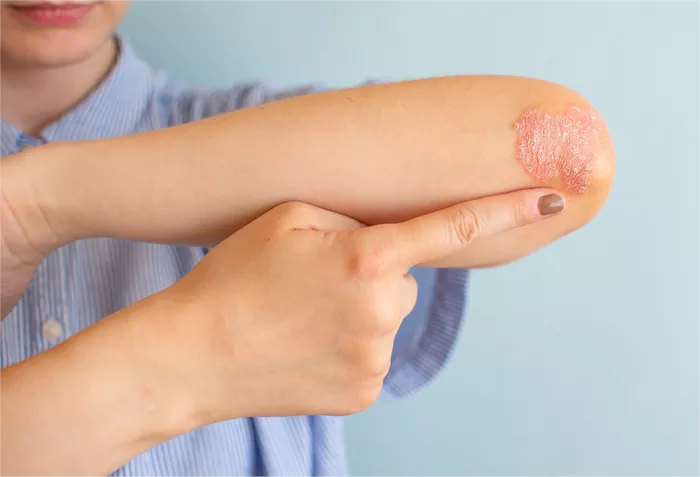Psoriasis is a chronic skin condition that leads to red, flaky patches on the skin. While there is no cure, several over-the-counter (OTC) topical treatments can help manage symptoms. This article explores the best OTC treatments for psoriasis, their effectiveness, and how to use them.
Understanding Psoriasis
Psoriasis is an autoimmune disease that speeds up the growth cycle of skin cells. The result is a buildup of cells on the surface of the skin, leading to scaling and inflammation. Common symptoms include:
- Red patches covered with thick, silvery scales
- Dry, cracked skin that may bleed
- Itching or burning sensations
Types of Psoriasis
There are different types of psoriasis, including:
Plaque Psoriasis: The most common type, characterized by raised red patches with silvery scales.
Guttate Psoriasis: Appears as small, drop-shaped lesions, often triggered by infections.
Inverse Psoriasis: Found in skin folds, causing smooth, red lesions.
Pustular Psoriasis: Characterized by white pustules (blisters) surrounded by red skin.
Understanding the type of psoriasis is essential for choosing the right treatment.
How Topical Treatments Work
Topical treatments for psoriasis work by reducing inflammation, slowing down skin cell turnover, and relieving itching. These treatments come in various forms, such as creams, ointments, gels, and foams.
Common Ingredients in OTC Treatments
When choosing a topical treatment, look for these key ingredients:
Salicylic Acid: Helps remove scales and reduces inflammation.
Coal Tar: Reduces scaling, itching, and inflammation.
Hydrocortisone: A mild corticosteroid that reduces inflammation and itching.
Moisturizers: Help soothe dry skin and improve the overall appearance of the skin.
SEE ALSO: What Does Foot Psoriasis Look Like?
Top OTC Treatments for Psoriasis
Here are some of the best OTC topical treatments for psoriasis:
1. Salicylic Acid Products
How They Work: Salicylic acid is a keratolytic agent. It softens and helps remove scales.
Best Options:
- Neutrogena T/Sal Shampoo: Effective for scalp psoriasis. It contains salicylic acid to help remove scales.
- Dermarest Psoriasis Medicated Lotion: Contains 3% salicylic acid and is suitable for various body areas.
Usage: Apply as directed on the packaging. Start with small amounts and increase as needed.
2. Coal Tar Preparations
How They Work: Coal tar reduces itching, scaling, and inflammation.
Best Options:
- MG217 Psoriasis Cream: Contains coal tar and is suitable for use on plaques.
- T/Gel Shampoo by Neutrogena: Specifically formulated for scalp psoriasis.
Usage: Apply daily or as directed. It can be messy, so consider using it before bed.
3. Hydrocortisone Creams
How They Work: Hydrocortisone is a mild corticosteroid that helps reduce inflammation.
Best Options:
- Cortizone-10: A popular over-the-counter hydrocortisone cream that can help with mild cases.
- Aveeno 1% Hydrocortisone Anti-Itch Cream: Great for relieving itching and inflammation.
Usage: Apply a thin layer to the affected area up to three times a day.
4. Moisturizers
How They Work: Moisturizers help keep the skin hydrated and can reduce flare-ups.
Best Options:
- Eucerin Advanced Repair Cream: Provides long-lasting moisture and is fragrance-free.
- CeraVe Moisturizing Cream: Contains ceramides to restore the skin barrier.
Usage: Apply generously to dry areas, ideally after bathing when the skin is still damp.
5. Aloe Vera Gel
How It Works: Aloe vera is known for its soothing properties and can help reduce redness and scaling.
Best Option:
- Nature Republic Aloe Vera Gel: Pure aloe vera gel that hydrates and soothes.
Usage: Apply directly to affected areas as needed. It’s gentle enough for daily use.
6. Omega-3 Fatty Acid Supplements
While not a topical treatment, omega-3 fatty acids can help reduce inflammation from the inside out.
Best Options:
- Fish Oil Capsules: Rich in omega-3 fatty acids.
- Flaxseed Oil: A vegetarian alternative.
Usage: Follow dosage instructions on the packaging. Consult a healthcare provider for personalized advice.
Application Tips for Topical Treatments
To maximize the effectiveness of topical treatments, consider the following tips:
Clean the Area: Wash the affected skin with a gentle cleanser before applying treatments.
Apply While Damp: Moist skin can absorb treatments better, so apply them after bathing.
Use Sparingly: A little goes a long way. Use the recommended amount to avoid irritation.
Follow a Routine: Consistency is key. Stick to a daily regimen for the best results.
Potential Side Effects
While OTC treatments are generally safe, some individuals may experience side effects, such as:
- Skin irritation or redness
- Itching or burning sensation
- Dryness or peeling
If you experience severe reactions, stop using the product and consult a healthcare provider.
When to See a Doctor
If OTC treatments do not improve your psoriasis after several weeks, or if you have severe symptoms, consult a dermatologist. They can recommend prescription treatments or other therapies, such as phototherapy or systemic medications.
Lifestyle Changes for Managing Psoriasis
In addition to topical treatments, certain lifestyle changes can help manage psoriasis:
Diet
Anti-inflammatory Foods: Incorporate foods rich in omega-3 fatty acids, such as fish, walnuts, and flaxseeds.
Fruits and Vegetables: Aim for a colorful variety to provide essential nutrients and antioxidants.
Stress Management
Stress can trigger flare-ups. Consider practices such as:
Meditation: Helps calm the mind and reduce stress.
Yoga: Promotes relaxation and flexibility.
Exercise: Regular physical activity can improve overall health and reduce stress levels.
Avoiding Triggers
Identifying and avoiding personal triggers is crucial. Common triggers include:
Smoking: Can worsen symptoms.
Alcohol: May increase the frequency of flare-ups.
Skin Injuries: Cuts or sunburn can trigger new lesions.
Conclusion
Managing psoriasis requires a multifaceted approach, including effective topical treatments. OTC options like salicylic acid, coal tar, and hydrocortisone can significantly improve symptoms. However, it’s important to combine these treatments with lifestyle changes and to consult a healthcare provider when necessary. With the right strategy, you can take control of your psoriasis and improve your skin health.



























